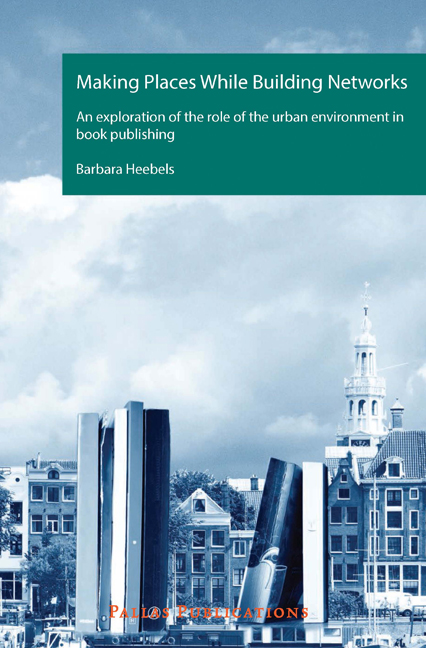Book contents
- Frontmatter
- Dedication
- Contents
- 1 Introduction
- 2 Creative Clusters in Berlin: Entrepreneurship and the Quality of Place in Prenzlauer Berg and Kreuzberg
- 3 Performing in Dutch Book Publishing 1880–2008: the Importance of Entrepreneurial Experience and the Amsterdam Cluster
- 4 Place-making from Publishing house to Book Fair: Dutch Book Publishers and the Role of Place in Establishing Trust and Reputation
- 5 Social Networks and Cultural Intermediaries: the Multiplexity of Personal Ties in Publishing
- 6 Conclusions
- References
- Appendix A Descriptive Statistics & Correlations
- Appendix B Characteristics of Interviewees
- Nederlandse Samenvatting
3 - Performing in Dutch Book Publishing 1880–2008: the Importance of Entrepreneurial Experience and the Amsterdam Cluster
Published online by Cambridge University Press: 20 January 2021
- Frontmatter
- Dedication
- Contents
- 1 Introduction
- 2 Creative Clusters in Berlin: Entrepreneurship and the Quality of Place in Prenzlauer Berg and Kreuzberg
- 3 Performing in Dutch Book Publishing 1880–2008: the Importance of Entrepreneurial Experience and the Amsterdam Cluster
- 4 Place-making from Publishing house to Book Fair: Dutch Book Publishers and the Role of Place in Establishing Trust and Reputation
- 5 Social Networks and Cultural Intermediaries: the Multiplexity of Personal Ties in Publishing
- 6 Conclusions
- References
- Appendix A Descriptive Statistics & Correlations
- Appendix B Characteristics of Interviewees
- Nederlandse Samenvatting
Summary
Abstract
This article investigates the spatial clustering of the book publishing industry. By means of a hazard model, we examine the effect of agglomeration economies and pre-entry entrepreneurial experience on the survival chances of publishing firms. Although such survival analyses have been conducted for manufacturing industries, they are scarce for cultural and service industries. Based on a unique data set of all book publishers founded between 1880 and 2008 in the Netherlands, this article demonstrates that the clustering of book publishers in the Amsterdam region did not increase the survival of Amsterdam firms in general. Instead, prior experience in publishing and related industries had a positive effect on firm survival. Publishing firms with such prior experience, like spinoffs, did perform better in Amsterdam. Interestingly, the Amsterdam cluster did not function as an attractor for publishing firms from other regions, but rather acted as an incubator for firms that relocated to other regions.
Introduction
This article aims to provide insight in the spatial evolution of the book publishing industry and the effect of urban agglomerations on the survival chances of publishers. Although numerous studies have examined the evolution of industries (see for example Klepper, 1997, 2002), studies investigating the spatial evolution of an industry from an evolutionary perspective are still scarce (Boschma & Frenken, 2003). There is increasing attention to the study of cluster life cycles, but empirical studies are still lacking (Menzel & Fornahl, 2009). Studies that do investigate the spatial evolution of an industry have predominantly examined the clustering of manufacturing industries (Boschma & Wenting, 2007; Klepper, 2007). Only a couple of studies have focused on non-manufacturing industries from an industry life cycle perspective (Fein, 1998; Carree, 2003). We investigate the evolution of the book publishing industry. To our knowledge, no study has investigated the spatial evolution of a cultural industry or service industry, exceptions being the global fashion industry (Wenting, 2008) and the Dutch banking industry (Boschma & Wenting, 2010).
Large parts of the cluster literature (Porter, 1998; Martin & Sunley, 2003) claim it can be an advantage to be located in a spatial cluster because geographical proximity and face-to-face contacts are required for the exchange of tacit knowledge.
- Type
- Chapter
- Information
- Making Places While Building Networks An exploration of the role of the urban environment in book publishing , pp. 55 - 84Publisher: Amsterdam University PressPrint publication year: 2012



